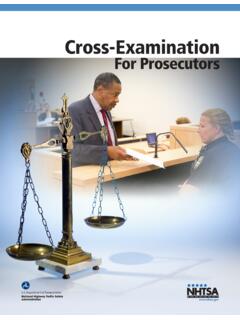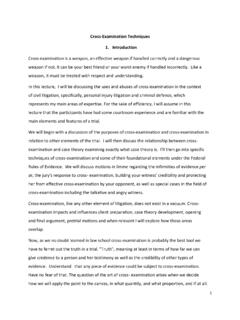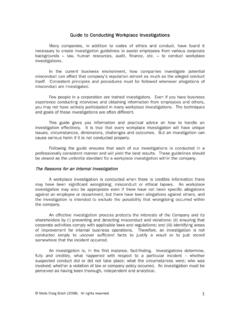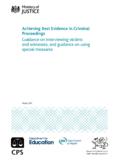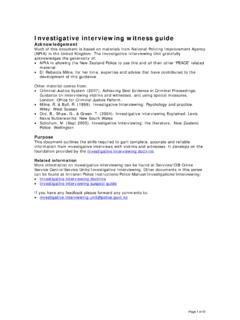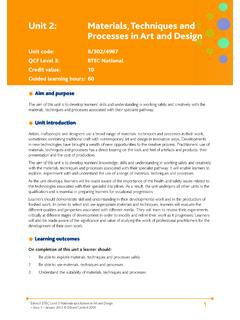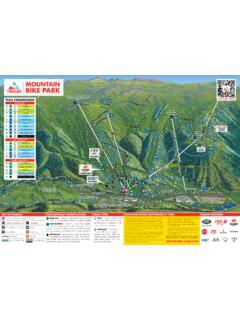Transcription of Basic Trial Techniques for Prosecutors
1 SPECIAL TOPICS SERIES American Prosecutors Research InstituteBasic Trial Techniquesfor ProsecutorsBasic Trial Techniquesfor ProsecutorsAmerican Prosecutors Research Institute99 Canal Center Plaza, Suite 510 Alexandria,VA J. CharronPresidentRoger FlorenChief of StaffStephen , National Traffic Law CenterDebra WhitcombDirector, Grant Programs & DevelopmentGeorge RossDirector, Grants ManagementThis document was produced thanks to a charitable contribution from the Anheuser-BuschFoundation in St. Louis, Missouri. Its support in assisting local Prosecutors fight against impaireddriving is greatly information is offered for educational purposes only and is notlegal advice.
2 Points of view or opinions expressed in this document are those of the authors anddo not necessarily represent the official position of the Anheuser-Busch Foundation, the NationalDistrict Attorneys Association, or the American Prosecutors Research Institute. 2005 by the American Prosecutors Research Institute, the non-profit research, training andtechnical assistance affiliate of the National District Attorneys TOPICS SERIESD avid I. GilbertAssistant State AttorneyMiami-Dade County State Attorney's OfficeMichael E. GilfarbAssistant State AttorneyMiami-Dade County State Attorney's OfficeStephen , National Traffic Law CenterMay 2005 Basic Trial Techniquesfor ProsecutorsBasic Trial Techniquesfor ProsecutorsDEDICATIONOur efforts are dedicated to the hundreds of thousands of impaireddriving victims and their families and the thousands of professionals andadvocates working to alleviate the impaired driving monograph is dedicated to the following individuals for their tire-less efforts to promote traffic safety:Mr.
3 John BoboMr. Bobo is the United States Department of Transportation s director ofDrug and Alcohol Policy and Compliance. Mr. Bobo previously served asdirector of the National Traffic Law Center (NTLC). As NTLC director,Mr. Bobo was nationally recognized for developing partnerships betweenprosecutors and other traffic safety partners and expanding NTLC sscope. He also provided training and assistance to hundreds of prosecu-tors and law enforcement officers around the country, initiated themonograph series, published numerous articles and revised national train-ing Jack RichmanDr.
4 Richman is a tenured full professor at the New England College ofOptometry. He is an internationally recognized expert in optometrywho has lectured around the world and published over 50 research andclinical articles and papers in professional journals and textbooks. is a Standardized Field Sobriety Training (SFST) instructor andan associate Drug Recognition Expert (DRE) instructor who consultsand works with the Massachusetts State Police, Massachusetts CriminalJustice Training Council, the New Hampshire State Police TrainingAcademy and Institute of Police Technology and Management (IPTM).
5 He also serves as the medical consultant to the International Associationof Chiefs of Police (IACP) National Highway Safety Committee s DRET echnical Advisory Panel and as a police surgeon with the Marbleheadand Yarmouth Police Luis Taborda Sergeant Taborda is a 13-year veteran of the Miami Police Department(MPD). Sergeant Taborda specializes in DUI and crash is a certified Intoxilyzer 5000R breath test operator and agencyinspector and DRE. He is certified to teach officers about theStandardized Field Sobriety Tests (SFSTs), radar, traffic laser, driving andfirearms. Sergeant Taborda is a recognized expert in DRE/DUI and traf-fic crash investigations.
6 Sergeant Taborda is, and always has been, dedicat-ed to DUI enforcement. Miami-Dade Mothers Against Drunk Driving(MADD) bestowed its highest award, the William Craig MemorialAward, to Sergeant Taborda in 1999, MPD gave him an AdministrativeAward of Excellence in 2000 and Citizens Against Drug ImpairedDriving ( ) recognized him in FORPROSECUTORSivAMERICANPROSECUTORSRESEA RCHINSTITUTETABLE OFCONTENTS1 Introduction 3 Pre- Trial Preparation7 General Trial Tips9 Voir Dire (Jury Selection)23 Opening25 Case in Chief (Direct Examination)29 Cross Examination35 Closing(s)41 ConclusionvINTRODUCTION Congratulations!
7 Let me be the first to welcome you to theProsecutor s Office. Here are your files. Lucky for you, crime is only have 200 courtroom is across the street. Goodluck! In many resource-strapped offices, this suffices for offices assign Driving Under the Influence (DUI)1cases to theirmost inexperienced DUIs can be as difficult to win ashomicide cases. DUI cases involve all types of evidence, including eye- witness testimony, documentary and other physical evidence, lay opiniontestimony, scientific evidence, expert testimony and an almost infinitenumber of complex issues. DUI Prosecutors must be familiar with thesevarious types of evidence and the rules governing their admission at also must learn to captivate their audience (the jury) and presenttheir cases convincingly, in a manner the jury can relate to and attorney and every case is unique; there are very few hard and fastcourtroom Techniques and must develop your own styleand adapt your strategy to each individual case.
8 However, there are max-ims or guidelines you should consider in developing your own style andstrategies. This monograph is designed to assist you to make appropriate,informed decisions, by providing differing perspectives, examples andtips. As you read it, be mindful that your jurisdiction may have rules,statutes or case law that prohibit you from employing some of states refer to DUI as Driving While Intoxicated or Driving While Impaired (DWI).2 American Prosecutors Research Institute s (APRI) National Traffic Law Center (NTLC) attorneysare available to assist you if you have questions or want further assistance.
9 You may contact theNTLC at (703) Trial starts long before the venire3is brought in. Simplystated, preparation is the key to victory. You must thoroughly familiarizeyourself with the evidence, case strengths and weaknesses, and the lawbeforeselecting a of the most important strategy decisions you make is selecting aproper theme. The theme is the general storyline of your case. Choose atheme that resonates with the average person. Whenever possible, choosea theme that motivates your jury to a catch phrase that captures your theme that you can usethroughout the Trial . Advertisements, quotation dictionaries, slogans andproverbs can be helpful.
10 You should be able to present your theme in afew short words or phrases. An easy way to start developing a theme isto say This is a case and finish that Tips: DUI Themes and Catch PhrasesTypical DUI themes revolve around responsibility andconsequences. Examples include: On _____, the defendant made some choices. Nowhe must bear the consequences. You drink. You drive. You lose. 4 The car came fully loaded. So did the defendant. 5 The defendant didn t control his drinking, so he couldn t con-trol his driving. 3 PRE-TRIALPREPARATION3In many jurisdictions, the courts refer to prospective jury panels as venires and prospectivejurors as venire persons.

